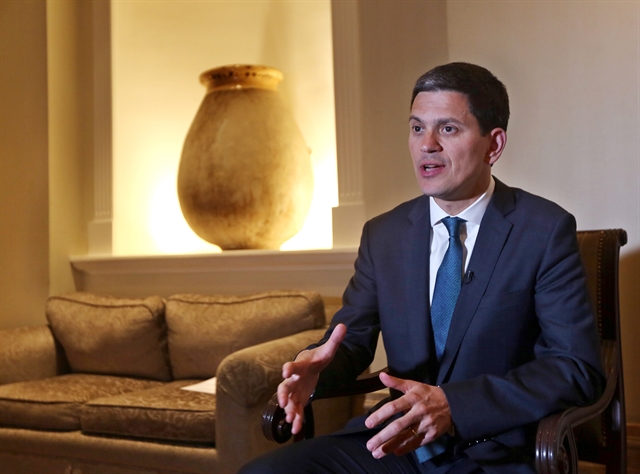You cannot be complacent about nuclear rhetoric

One of the most charismatic British politicians of his generation and a former UK foreign secretary (2007-2010), David Miliband has been the president and CEO of the International Rescue Committee (IRC) since 2013. Based in New York and founded at the call of Albert Einstein in 1933, the IRC is helping communities and people in more than 40 countries to cope with humanitarian crises.
The IRC has been playing a significant role in helping refugees in Greece and is now acting in the Ukraine refugee crisis. Miliband spoke to Kathimerini about the new challenges in an increasingly unstable world.
We are already facing the biggest refugee crisis in Europe since WWII. What does the IRC do?
The International Rescue Committee (IRC) is the largest refugee resettlement agency in America. We are bringing our experience to Europe and we’ve run extensive programs in Germany, Greece and Italy. First, we support children to make an effective entry into school. And second, we help adults getting into the labor market. We are also working with vulnerable groups, women who maybe have suffered abuse and disabled people. Therefore, we already help refugees from Ukraine.
Don’t you expect that in a few weeks’ time the refugees will be able to return to Ukraine?
We have to avoid the “happy news” syndrome. Many times governments have assumed that refugees are coming for a short period but the experience suggests that they come for a long time. We have to hope for the best but plan for the worst.
The West is “cancelling” Russia while tensions with China remain high. Is this the end of globalization as we know it?
We’re not trying to “cancel Russia” or humiliate Russia. The decision to invade Ukraine was taken by a very small number of people – or perhaps by one person. But the world can’t afford a state as big and strong as Russia to behave as if there is no such thing as international law.
Do you fear a nuclear escalation?
I think that anyone who is complacent about rhetoric in respect of nuclear policy is inviting real disaster. Equally, I don’t think we should fall for anything hysterical. The [Joe] Biden Administration has reacted in extremely mature way to the Russian nuclear posture. And I think that’s how we should continue to behave.
‘The world can’t afford a state as big and strong as Russia to behave as if there is no such thing as international law’
Is there an exit strategy? What would you do if you were the UK foreign secretary today?
The first thing I would be doing is working very closely with the European Union and making sure that the cooperation between Britain and the European Union on foreign and defense policy would be strong enough.
The EU-Turkey deal on migration turns six years old in a few days. Would you call it a successful agreement?
The position of refugees and refugee policy in the European Union today is best described as one of limbo – and that is not healthy. Of course, limbo is not the same as disaster. I’m not using catastrophic language. But people are still stuck on the islands. Europe still does not have a refugee resettlement policy and an asylum and migration set of standards.
Are you satisfied by the collaboration between Greece and the IRC?
Local people and local authorities have been very open to work with us. We’ve worked in Thessaloniki and Athens. At the national level the prime minister and his ministers have always been open to the points that we have made. Greece needs recognition of the particular vulnerabilities that it has because of its geography and therefore the need for effective European policies is especially great.
Did you have any particular message for the Greek government?
The IRC has experience from 40 countries, many of which are hosting refugees. It’s important to always try to see that these people contribute to the host state. The most successful approach to refugees is to ensure that they are effectively integrated into local life. Our work with vulnerable children, but also with refugee adults, is to try to make sure that they make a contribution to Greek society as well as receive the benefits of living in safety.
The refugee crisis in Ukraine erupted suddenly, but Afghanistan and Syria still face huge problems.
Many people in Afghanistan, Syria and Ethiopia are trapped in terrible circumstances. The Ukraine crisis should help us reset our mind and adopt a global thinking. The millions of refugees from Ukraine are added to 32 million refugees worldwide. Asylum seekers globally have reached a record number since WWII. I always try to remind people that Ukraine is the capstone of the age of impunity.
The age of impunity is a term you first used. But do you feel like that the reaction from the West to Ukraine highlights the end of the age of impunity?
I wish. But I think that we’re a long way from feeling that the age of impunity has ended. Perhaps we got to see a lot more of these disgraceful tactics going forward. Our message should be that alongside the right of states there is the right of civilians and the human rights.
What we tend to forget these days is the climate crisis. That the climate crisis will cause future wars and displace far greater numbers.
I think the real job to do is both to help communities adapt to the climate crisis and also critically fight the next stages of the climate crisis. It’s very significant that as a result of the Ukraine crisis we recognize that there are clear national security as well as climate reasons for Europe to get off its dependence on fossil fuels. What the Ukraine crisis shows is that we should have been getting off Russian oil and gas 10 years ago. Ukraine shows that there is an alignment between the need to decarbonize the economy and the need to strengthen our national security as Europeans.






